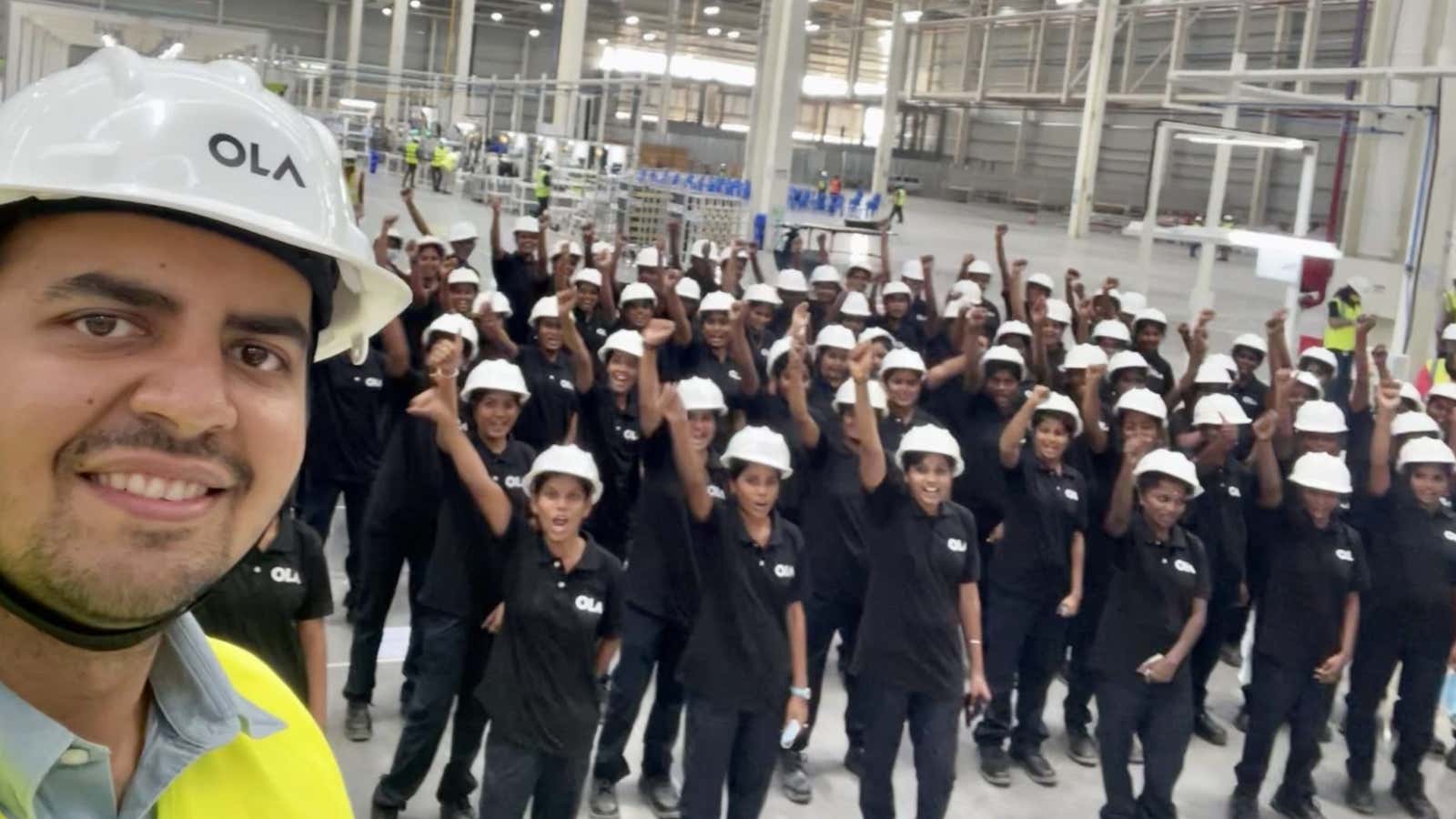Ola is on a mission to create a women-only shop floor.
Today (Sept. 13), the ride-hailing giant’s CEO Bhavish Aggarwal announced that the Ola Future Factory—the Tamil Nadu plant where its highly-anticipated electric scooters will be manufactured—”will be run ENTIRELY by women, 10,000+ at full scale! It’ll be the largest all-women factory in the world!!”
“This is the first in a series of initiatives we are undertaking at Ola to create a more inclusive workforce and provide economic opportunities for women across the board,” the company said in a blog post.
The announcement comes just three days after Ola’s website problems meant that its hotly anticipated electric scooter failed to go on sale, getting people worked up about possible delays in production. On Sept. 12, Aggarwal tweeted the factory was “getting ready double quick for deliveries.”
If Ola makes good on its promise, it will create the only all-women automotive manufacturing facility in the world.
Who are the women at Ola’s Future Factory?
While much of the assembly line is automated, these women—mostly graduates from in and around the southern state of Tamil Nadu—are being trained to fill a variety of technical roles, from production assistants to supervisors.
“They will be responsible for the entire production of every vehicle manufactured at Ola Future Factory,” the company said.
On the ground level, these workers will be manning the floors, carrying out maintenance and repairs while 3,000-odd robots are at work. Additionally, some of the staff will be dedicated to maintaining over 100 acres of forest in and around the factory.
So far, hundreds of women have already begun work at the plant which will supposedly roll out one scooter every two seconds once it is fully-functional. Currently, they are all trainees. Once they transition to full-time employment, they will be eligible for benefits such as medical insurance, maternity leave, and more.
Where are the women in Indian manufacturing?
Ola wouldn’t be the first to have a 100% female factory in India. Kirloskar Brothers, which produces industrial valves, has been running a women-only factory in Coimbatore for over a decade now. Mumbai-based consumer goods behemoth Hindustan Unilever has since December 2014 had a 100% female shop floor at its Haridwar plant.
But these companies are in the minority. On average, women fill a mere 12% of manufacturing jobs in India.
Of course, there must be robust infrastructure and policies in place before women clock in at these plants. At luxury car maker Daimler India’s factories, for instance, the company had to add women’s restrooms and change rooms, and conduct gender sensitivity training for existing male staff, before onboarding women. German manufacturer Schwing Stetter’s Tamil Nadu factory arranged a hostel for young women employees. Some Tata Motors factories provide creche facilities for women with kids.
Employers feel women are better at following complex instructions, take fewer breaks, register higher attendance, and are more dextrous, making them well-suited to factory jobs. However, women have so far lacked awareness of vacancies and dependable role models in the sector. And the biggest reason they’ve been kept out? They are not, supposedly, cut out for the manual labour.
However, in the age of automation, that argument seems null and void.
“There are misconceptions that women cannot work in manufacturing because there is a lot of heavy lifting to do. And yet, today’s automated shop floors mean that everything is mechanized and there are hauls and lifts that do all the heavy lifting,” Gajendra Chandel, former chief human resource officer at Tata Motors, said in 2017. “All that needs to be done is to train women to work in such plants, especially in areas where a higher order of dexterity and motor skills are required.”
